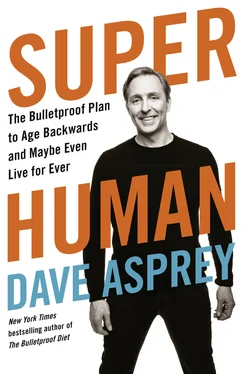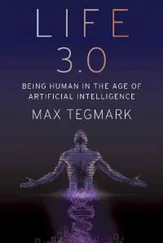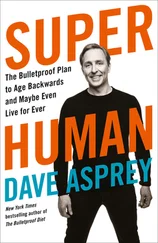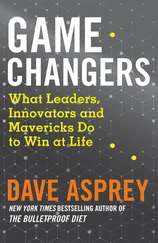There is no doubt that strategies like ketosis, intermittent fasting, and the maintenance of a healthy circadian rhythm play a critical role in our longevity. This leads to the next essential step on our quest to become Super Human—and that is getting enough highly efficient, good quality sleep.
Bottom Line
Want to not die? Do these things right now:
• Avoid all conventionally grown grains, produce, and animal products. Even better, skip grains altogether and opt for tons of organic vegetables, limited organic fruit, and meat from pastured animals.
• Don’t eat fried stuff. Ever.
• Eat enough protein (from pastured animals, eggs, wild fish, or nonallergenic plants) for tissue repair and an additional 20 plus grams of grass-fed collagen, and don’t fry, char, blacken, or barbecue meat (sorry). For lean people, that’s 0.5 grams per pound of body weight. For obese people, that’s about 0.35 grams per pound of body weight. For pregnant women, elderly folks, or athletes, it’s 0.6 grams per pound.
• No matter how much fat or how little fat you eat, eat the right ratios. Lean people eat about 50 percent saturated, 25 percent monounsaturated, and 15 to 20 percent undamaged omega-6 and 5 to 10 percent omega-3, including EPA and DHA. If you are fat like I used to be and want to live like a Super Human, eat 50 to 70 percent saturated, 25 to 30 percent monounsaturated, and only 10 percent undamaged omega-3 and omega-6, with added EPA and DHA so that you eat more omega-3 than omega-6.
• On some days, limit your eating window to eight to ten hours a day based on what works best for your schedule. Good options are 12:00 P.M.–8:00 P.M., 9:00 A.M.–5:00 P.M., or 10:00 A.M.–7:00 P.M. Have breakfast sometimes, especially if you’re tired or stressed. Don’t eat after dark.
• Teach your metabolism to be flexible by having ketones present in your system every week. Practice a cyclical ketogenic diet by fasting, avoiding carbohydrates for a few days, or adding “energy fats” to your food (or coffee) that convert directly to ketones.
4
SLEEP OR DIE
Sleeping feels good, but ever since I was a kid, there was always something more fascinating and productive I’d rather do than go to bed. I resented having to dedicate so many hours each day to something I saw as basically a waste of time. So for most of my life I skimped on sleep. Even the first two years after founding Bulletproof, I slept for about four hours a night, at most a self-imposed five hours. I used the extra three hours a day to be a father, start Bulletproof, and still pay the bills with my day job.
My sleep deficit almost certainly contributed to the diseases of aging I faced as a young man. It turns out that lack of quality sleep doesn’t just leave you tired and unable to perform in the moment; it also rapidly accelerates aging. The good news is that you can learn to be a Super Human sleeper and cram more high quality sleep into fewer hours and still get all the benefits. For the past five years, I have been getting progressively healthier, leaner, and younger on six hours and five minutes of sleep a night, but I use every technique in this chapter to sleep like a professional.
Perhaps you will choose to get more sleep than I do. Regardless of how many hours you sleep, the information in this chapter is intended to help you make the most of the sleep you do get. It doesn’t matter how old you are, how busy you are, or how much money you have. Sleep is the ultimate tool to sharpen every skill and add more quality years to your life. So get better at it.
HOW LACK OF SLEEP WILL KILL YOU
Like it or not, a lack of good sleep directly increases your risk of dying from one of the Four Killers. Meanwhile, just one good night of sleep can improve your ability to learn new motor skills by 20 percent, 1and getting regular quality sleep increases your ability to gain new insight into complex problems by 50 percent. 2This improved brain function could potentially help ward off cognitive decline with age and is befitting of a true Super Human. Good quality sleep also promotes skin health and youthful appearance, 3controls optimal insulin secretion 4(making you less likely to develop diabetes), and encourages healthy cell division. 5Sleep is an essential strategy in protecting against all Seven Pillars of Aging.
In the previous chapter we discussed Satchin Panda’s research on longevity and circadian rhythms. As part of my research for this book I went to his lab and had a great time with his PhD students looking at how the combination of food, light, and too little sleep affected rats. They walked me through new research showing that eating late at night dramatically reduced the quality of the rats’ sleep and that poor sleep impacted the rats’ ability to control blood sugar by up to 50 percent. That’s huge! In fact, it’s more than what most medications can do.
In rats and humans, the pancreas is responsible for making insulin. Satchin has studied insulin-producing cells in the pancreas and found that they, too, have their own circadian rhythm. At night when melatonin, a hormone that helps regulate wake and sleep cycles, is released, insulin-producing cells shut down, too. So if you eat something sugary late at night, your body’s insulin response is not as effective as usual. So that late-night piece of cake leads to a blood sugar spike and then a crash that triggers the release of adrenaline … which keeps you awake at three A.M.
If you get less than six hours of sleep, the hormones that control how hungry and/or satiated you feel (ghrelin and leptin, respectively) start to work against you. Ghrelin increases, making you feel hungry, and leptin decreases, making it more difficult for you to feel satiated. This is one reason that sleep loss leads to obesity and all the many health problems that go along with it. 6
Sleep is also incredibly important for warding off Alzheimer’s disease, the killer many of us fear most as aging begins its silent creep. When you are asleep, your brain undergoes a natural detoxification process. The glymphatic system, a waste clearance pathway comparable to the lymphatic system, which drains fluids from tissues in the body, sends cerebral spinal fluid through the brain’s tissue and flushes out cellular waste and neurotoxins. 7
This is a big deal, as the glymphatic system clears out the amyloid proteins that are the hallmark of Alzheimer’s when they build up in the brain. While we don’t yet have hard evidence that Alzheimer’s disease is caused by a lack of sleep and thus not enough time for the glymphatic system to work its magic, I would wager that it’s a contributing factor. In fact there is some evidence of this. A small study on twenty human participants showed that losing just one night of sleep causes an increase in amyloid proteins in the brain. 8That may be a small sample, but it’s enough to convince me to make sure my glymphatic system has a chance to fully detox my brain each night. That doesn’t mean sleeping for eight hours; it means sleeping like a boss.
Since mitochondria play a role in the glymphatic system process and sleep in general, everything you do to strengthen your mitochondria can also help you sleep better and thus keep your brain clear of amyloid plaques. There are also simple things you can do to enhance your glymphatic system function. For example, studies on rats show that sleeping on one’s side improves glymphatic clearance compared to sleeping on the stomach or the back. 9While we don’t have studies proving that this transfers to humans, we know that side-sleeping humans have lower blood pressure and heart rate. 10Sadly, they also get more vertical wrinkles than back sleepers, but sleeping on your back increases your risk of sleep apnea, a condition in which the upper airway becomes blocked during sleep. Sleeping on your back will make you less wrinkled but more likely to die. Not a great trade-off. I’d opt to stay alive and hit those wrinkles with other hacks in this book.
Читать дальше












